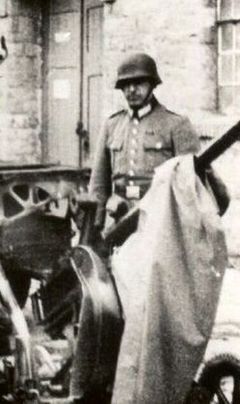- Kurt Küttner
-
The title of this article contains the character ü. Where it is unavailable or not desired, the name may be represented as Kurt Kuettner.
Kurt Küttner 
Kurt KüttnerNickname Kiwe (Yiddish) Born 1907 Died 1964 Allegiance  Nazi Germany
Nazi GermanyService/branch  Schutzstaffel
SchutzstaffelRank SS-Oberscharführer (Staff Sergeant) Commands held lower camp of Treblinka Kurt Küttner (1907 — 1964) was an SS-Oberscharführer (Staff Sergeant) who served at Treblinka extermination camp.
Before World War II, Küttner worked for many years as a warden in the German police. At Treblinka he was in charge of the lower camp of Treblinka II, where he became one of the most feared and hated SS officers. He would follow people around, stop them and search for money, pictures or any family mementos that the prisoners would try to hide on their person. If he caught someone carrying anything, he would beat the prisoner cruelly and send him to the Lazarett, or infirmary, where the prisoner was killed. In his capacity as commander of the Lower Camp and over the Jewish prisoners, he wanted to know exactly what was going on throughout his jurisdiction. He therefore exploited the weakness or baseness of some of the prisoners and turned them into informers. He received the nickname "Kiwe" from the prisoners.[1]
Küttner decided to have the worker Jews (Arbeitskommando) who worked in the "hospital" of his lower camp wear armbands bearing the red cross emblem, so as to deceive the true nature of the "hospital" as a killing station.[2]
As recalled by SS-Unterscharführer (Corporal) Franz Suchomel:
“ From one of the transports that arrived in October 1942, Küttner removed ten or twelve young boys and put them to work at various service tasks in the camp. One of the boys he appointed capo [sic] of the group. After about three weeks, the boy was caught giving gold coins to one of the Ukrainians, and Küttner had him, along with all the other boys in the group, taken to the gas chambers.[3] ” Küttner was also in charge of whipping prisoners at the evening roll call. Samuel Willenberg, one of the prisoners at Treblinka, recounts how this went:
When we had finished our rendition, Kiwe recited the numbers of the prisoners due for lashing on their naked posteriors that day. Each such prisoner would be tied to the stool and given twenty-five lashes with a whip as he [Küttner] counted the blows aloud.[4]
Küttner also served in the SS in Italy.
After the war, Küttner, along with ten other former SS officers from Treblinka, was arrested and charged at the Treblinka trials, but he died before the trial began in 1964.[5]
References
- ^ Yitzhak Arad (1987). Belzec, Sobibor, Treblinka: The Operation Reinhard Death Camps, Bloomington: Indiana University Press, p. 191
- ^ Klee, Ernst, Dressen, Willi, Riess, Volker (1991). The Good Old Days: The Holocaust as Seen by Its Perpetrators and Bystanders, p. 245. ISBN 1-56852-133-2.
- ^ Sereny, Gitta: Into that Darkness - From Mercy Killing to Mass Murder, p. 259. London: McGraw-Hill Book Company, 1974.
- ^ Willenberg, Samuel. Revolt in Treblinka, p. 133. Warsaw: Zydowski Instytut Historyczny
- ^ First Treblinka Trial
Other death camps: Auschwitz-Birkenau · Bełżec · Chełmno · Jasenovac · Majdanek · Maly Trostenets · SobiborCamp organizers Odilo Lotario Globocnik • Hermann Julius Höfle • Richard Wolfgang Thomalla • Erwin Hermann Lambert • Christian WirthCommandant Deputy commanders Heinrich Arthur Matthes • Karl Pötzinger • Theodor von EupenGas chamber executioners Fritz Schmidt • Gustav MünzbergerOther officers Max Biala • Paul Bredow • Herbert Floss • Erich Fritz Erhard Fuchs • Lorenz Hackenholt • Josef Hirtreiter • Otto Richard Horn • Kurt Küttner • Karl Emil Ludwig • Willy Mätzig • Willi Mentz • August Wilhelm Miete • Max Möller • Willi Post • Albert Franz Rum • Karl Schiffer • Otto Stadie • Ernst Stengelin • Franz SuchomelGuards Germans/Austrians:
Ukrainians: Ivan Demjanjuk • Feodor Fedorenko • Ivan Ivanovich Marchenko • Nikolay Yegorovich Shalayev • other Volksdeutsche and prisoners of war (90 to 120)
Latvians:Prominent victims Ernst Arndt • Yitzchok Breiter • Artur Gold • Ludwik Holcman • Janusz Korczak • Yechiel Lerer • Yitzchak Lowy • Simon Pullman • Natan Spigel • Lidia ZamenhofResistance and survivors Nazi occupation and organizations Planning, methods,
documents and evidenceWar crimes investigations and trials Treblinka TrialsRelated articles Categories:- 1907 births
- 1964 deaths
- German police officers
- SS non-commissioned officers
- Holocaust perpetrators
- Treblinka extermination camp personnel
- Treblinka Trials
Wikimedia Foundation. 2010.
